Without Limits: A Shared Vision for the Future of Career Technical Education (CTE Without Limits) was released in March 2020 with the support of over 40 national organizations. In October 2021, Advance CTE launched a technical assistance opportunity called Advancing CTE Without Limits, which sought to support states in a project to coordinate systems, improve equity goals, strengthen policy or otherwise align with a CTE Without Limits principle. The year-long Advancing CTE Without Limits project ran from March 2022 to March 2023. This blog series shares the details, outcomes and lessons learned from projects across the three participating Pushing the Limits state teams – Colorado, Nebraska and South Carolina.
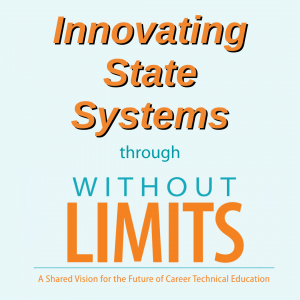 Over the past year, three states – Colorado, Nebraska and South Carolina – leveraged CTE Without Limits in their states to improve Career Technical Education (CTE) practice through technical assistance and strategic planning. Each state took a different approach and focused on a different CTE Without Limits principle, but ultimately each state centered its project around leveraging tools and resources already at its disposal to realign and refocus state practice for all CTE learners. All three states took an innovative approach to revitalizing existing policy and strategy and the alignment work vital to their year-long projects is already paying dividends. For more information about each state’s project check out the previous posts in this blog series.
Over the past year, three states – Colorado, Nebraska and South Carolina – leveraged CTE Without Limits in their states to improve Career Technical Education (CTE) practice through technical assistance and strategic planning. Each state took a different approach and focused on a different CTE Without Limits principle, but ultimately each state centered its project around leveraging tools and resources already at its disposal to realign and refocus state practice for all CTE learners. All three states took an innovative approach to revitalizing existing policy and strategy and the alignment work vital to their year-long projects is already paying dividends. For more information about each state’s project check out the previous posts in this blog series.
This year, Advance CTE is continuing to help states innovate their state systems through CTE Without Limits. Earlier this year, we opened an application for technical assistance to help states specifically interested in strategic planning and alignment support. Four states – Indiana, Nevada, Oregon and Rhode Island – are working with Advance CTE and Association for Career and Technical Education (ACTE) coaches to build strategic goals, centered around a statewide theory of action, or revamp state plans for the Strengthening Career and Technical Education for the 21st Century Act (Perkins V). The initiative, Innovating State Systems through CTE Without Limits, will run from June 2023 to June 2024.
While previous technical assistance efforts were focused on individual state projects, this year’s project builds specifically on the strategic planning process. Each state will create a 12-month action plan and will have opportunities to begin to pilot some of the initiatives embedded in their new strategic plans. Each state will build a statewide team made of stakeholders within and outside of their CTE agency to ensure their strategic goals meet the needs of learners, families, educators and administrators statewide. Participating state team members will also engage in quarterly cross-state sharing sessions to discuss insights and lessons learned.
Advance CTE Senior Advisor and project lead Eliza Fabillar hopes the value of this technical assistance opportunity will be clear: “The Innovating State Systems initiative will help participating states develop and implement strategic priorities to strengthen the career preparation ecosystem for all learners, which will lay the groundwork for continued quality implementation after the project period. Advance CTE members will also benefit from lessons learned, which will be shared with the CTE community.”
Kickoff meetings with each state’s State CTE Director have already started and progress will continue throughout the next year. Stay tuned for future updates about this project.
For more information about CTE Without Limits, visit https://careertech.org/without-limits. To begin processes like this in your own state or locality, view our CTE Without Limits roadmaps and view this resource recap to see how to use these tools step-by-step.
Dan Hinderliter, Senior Policy Associate



 Project Focus
Project Focus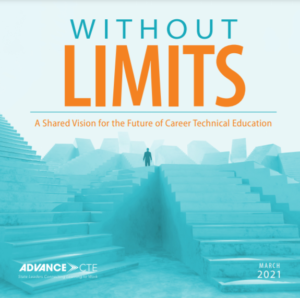 In March 2021, Advance CTE released
In March 2021, Advance CTE released  Nebraska
Nebraska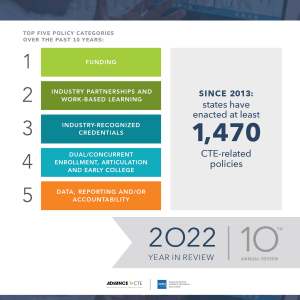
 As part of ongoing blog topics aimed at supporting all learners in the realization of the national vision for the future of Career Technical Education (CTE),
As part of ongoing blog topics aimed at supporting all learners in the realization of the national vision for the future of Career Technical Education (CTE),  In March 2021, Advance CTE released
In March 2021, Advance CTE released  Once DSD administration began conversations with educators and staff, they recognized the need to create schoolwide “Without Limits Teams,” comprised of a school administrator, special education staff, school counselors, and the school’s CTE coordinator. Last spring, school staff from each of the 25 DSD schools were each brought together in full day district-wide workshops structured on the five CTE Without Limits principles and designed using Advance CTE’s
Once DSD administration began conversations with educators and staff, they recognized the need to create schoolwide “Without Limits Teams,” comprised of a school administrator, special education staff, school counselors, and the school’s CTE coordinator. Last spring, school staff from each of the 25 DSD schools were each brought together in full day district-wide workshops structured on the five CTE Without Limits principles and designed using Advance CTE’s 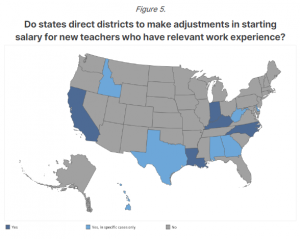
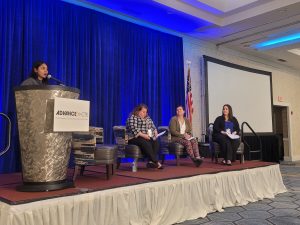 On Friday, May 13, attendees at Advance CTE’s Spring State Leadership Retreat heard from three State CTE Directors participating in Advance CTE’s state cohort to begin implementation of
On Friday, May 13, attendees at Advance CTE’s Spring State Leadership Retreat heard from three State CTE Directors participating in Advance CTE’s state cohort to begin implementation of 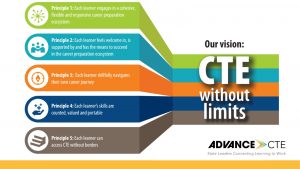 Nebraska’s focus is advancin
Nebraska’s focus is advancin